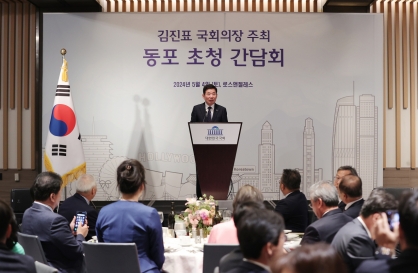Realistic discussions needed on restarting nuclear reactors
By Korea HeraldPublished : April 20, 2012 - 19:59
Discussions on whether to restart the Nos. 3 and 4 reactors at Kansai Electric Power Co.’s Oi nuclear power plant in Fukui Prefecture appear to have strayed off course.
How should the government ensure a stable power supply, a basic requirement for people’s daily lives? We want the government to figure out realistic measures on this issue in a cool-headed manner.
Prime Minister Yoshihiko Noda and other ministers concerned recently held meetings during which they worked out new safety standards for nuclear power plants, and confirmed the safety of the Oi plant based on these criteria.
On Saturday last week, Economy, Trade and Industry Minister Yukio Edano visited Fukui Prefecture and asked Fukui Gov. Issei Nishikawa and others for cooperation in restarting the Oi reactors. We think this was a reasonable step toward resuming operation of the reactors.
However, the governors of Kyoto and Shiga, Fukui’s neighboring prefectures, have criticized the government’s safety confirmation as “hasty.” On Tuesday, the governors jointly announced a seven-point proposal to the government, including a call to set up a third-party panel to verify electricity demand estimates made by power utilities.
They apparently strongly believe the government’s safety confirmation ― which was made after the ministers concerned held six meetings over a span of about 10 days ― was premature.
However, the government took many steps before confirming the reactors were safe to operate, such as working out emergency precautions, conducting stress tests and compiling a 30-point safety checklist. The government needs to explain such developments meticulously to seek public understanding on this matter.
Meanwhile, Osaka Mayor Toru Hashimoto has caused a stir by repeatedly voicing opposition to the restart of the reactors. His city is a major shareholder in KEPCO.
Criticizing the government’s decision-making process for the restart, Hashimoto said, “We must topple the government led by the Democratic Party of Japan.” In response, DPJ Secretary General Azuma Koshiishi said, “We’ll rise to the challenge.”
With an electricity crisis looming, they should not escalate political conflicts unnecessarily.
Hashimoto said, “Once [the government] accepts the possibility there could be planned blackouts, it can overhaul the current power supply system.”
However, Panasonic Corp. Vice Chairman Masayuki Matsushita scoffed at this comment. “Planned blackouts are absurd,” Matsushita said. “He shouldn’t mention them lightly.”
We think Matsushita’s argument is fair.
Unless the restart of the reactors is approved, areas under KEPCO’s jurisdiction are expected to face an electricity shortfall of up to about 20 percent this summer. This shortage would deal a blow to the regional economy. If rolling blackouts are carried out, companies would struggle to make production plans and might leave the Kansai region. That would accelerate the region’s industrial hollowing-out.
Hashimoto should not play down the possible negative impact of a power crisis.
Edano’s flip-flopping remarks also have caused confusion. It is unclear whether he favors restarting idled reactors or abandoning nuclear power.
At a press conference Tuesday, Edano apologized for the lack of clarity, saying, “I don’t mean to be indecisive, but there are things I haven’t been able to explain well.”
Edano should fulfill his responsibility as the minister responsible for the restart of nuclear reactors.
(The Yomiuri Shimbun)
(Asia News Network)
How should the government ensure a stable power supply, a basic requirement for people’s daily lives? We want the government to figure out realistic measures on this issue in a cool-headed manner.
Prime Minister Yoshihiko Noda and other ministers concerned recently held meetings during which they worked out new safety standards for nuclear power plants, and confirmed the safety of the Oi plant based on these criteria.
On Saturday last week, Economy, Trade and Industry Minister Yukio Edano visited Fukui Prefecture and asked Fukui Gov. Issei Nishikawa and others for cooperation in restarting the Oi reactors. We think this was a reasonable step toward resuming operation of the reactors.
However, the governors of Kyoto and Shiga, Fukui’s neighboring prefectures, have criticized the government’s safety confirmation as “hasty.” On Tuesday, the governors jointly announced a seven-point proposal to the government, including a call to set up a third-party panel to verify electricity demand estimates made by power utilities.
They apparently strongly believe the government’s safety confirmation ― which was made after the ministers concerned held six meetings over a span of about 10 days ― was premature.
However, the government took many steps before confirming the reactors were safe to operate, such as working out emergency precautions, conducting stress tests and compiling a 30-point safety checklist. The government needs to explain such developments meticulously to seek public understanding on this matter.
Meanwhile, Osaka Mayor Toru Hashimoto has caused a stir by repeatedly voicing opposition to the restart of the reactors. His city is a major shareholder in KEPCO.
Criticizing the government’s decision-making process for the restart, Hashimoto said, “We must topple the government led by the Democratic Party of Japan.” In response, DPJ Secretary General Azuma Koshiishi said, “We’ll rise to the challenge.”
With an electricity crisis looming, they should not escalate political conflicts unnecessarily.
Hashimoto said, “Once [the government] accepts the possibility there could be planned blackouts, it can overhaul the current power supply system.”
However, Panasonic Corp. Vice Chairman Masayuki Matsushita scoffed at this comment. “Planned blackouts are absurd,” Matsushita said. “He shouldn’t mention them lightly.”
We think Matsushita’s argument is fair.
Unless the restart of the reactors is approved, areas under KEPCO’s jurisdiction are expected to face an electricity shortfall of up to about 20 percent this summer. This shortage would deal a blow to the regional economy. If rolling blackouts are carried out, companies would struggle to make production plans and might leave the Kansai region. That would accelerate the region’s industrial hollowing-out.
Hashimoto should not play down the possible negative impact of a power crisis.
Edano’s flip-flopping remarks also have caused confusion. It is unclear whether he favors restarting idled reactors or abandoning nuclear power.
At a press conference Tuesday, Edano apologized for the lack of clarity, saying, “I don’t mean to be indecisive, but there are things I haven’t been able to explain well.”
Edano should fulfill his responsibility as the minister responsible for the restart of nuclear reactors.
(The Yomiuri Shimbun)
(Asia News Network)
-
Articles by Korea Herald



![[AtoZ Korean Mind] Does your job define who you are? Should it?](http://res.heraldm.com/phpwas/restmb_idxmake.php?idx=644&simg=/content/image/2024/05/06/20240506050099_0.jpg&u=)















